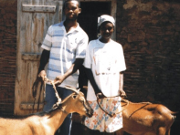Haiti (MNN) – The people of Haiti have a long-running history with disaster and poverty. One ministry is using business loans to help locals build themselves out of the cycle.
For 20 years FARMS International has operated two separate loan programs in Haiti. Surviving hurricanes, earthquake, and sickness, these locally-run programs seek to strengthen communities by offering business loans through local churches. Projects typically revolve around agriculture and livestock, says FARMS Executive Director Scott Clifton.
One program issues 35 loans a year while another had issued more than 300 before natural disaster setbacks. They’re working back up again, and 60-65 families are currently loan recipients.
(Photo courtesy of FARMS International).
Among the recipients are many large families with 7-10 kids. Widows with FARMS loans have been able to create livelihoods for themselves and their families.
Haitian loan participants often buy goats and pigs. With the additional money or livestock they are able to pay back the loan, allowing money to go out again.
Those extra livestock are a form of security for many families.
“If they have goats and they need an emergency expense… then they’ll sell one of the goats and they’ll have that money available,” Clifton says.
The earnings also go back into the community through church offerings, adding an extra layer of support. Learn more about FARMS here.
Relief vs. Development

(Photo courtesy of FARMS International).
There is an important place for relief, but that’s not where FARMS does its best work. In cases of disaster and war, fast externally sourced relief can be life-saving. FARMS does its best work by addressing the long term.
“Haiti really is a place with a lot of need and a lot of poverty. It’s a difficult situation to work in, because the need is so evident, yet at the same time there’s so many people trying to help. There’s more NGOs per capita than any other nation and so there can be a real problem of dependency as well,” Clifton says.
The FARMS approach focuses on local development and dignity.
“They’re joining the purpose that God has for their life by using the gifts and talents that God has given them. And when people have that… dignity, participating in the kingdom in that way, that can be really transformative,” he says.
Haiti’s Unique Training Program
FARMS loan programs are each run by a local board of directors who receive training in business and on what to look for in a loan. The Haitian directors decided to go a step beyond and provide general and technical training for all loan recipients, Clifton says.
Pastor Renaud, one of the Haiti program directors, describes the process as ‘like training a toddler to walk.’
First they stand, then they take their first steps, and soon they’re running around having completed their business development.
Pastor Renaud and the other Haitian FARMS leaders have made development even easier for program participants.
“It was something that they developed because they saw the need, and when they developed it, they saw it meet that need. And so they continued with it. And that’s a great model to follow,” Clifton says.
He thinks the Haitian Loan Program’s training may be helpful in other locations.
How Can I Pray?
Pray for the residents of Haiti and other FARMS locations around the world during the COVID-19 pandemic. Cases have now reached Haiti, but social distancing is often not possible due to close quarters and an inability to stop working.
“It’s just a very difficult situation if diseases start to spread rapidly.”
Pray for the success of FARMS programs and local loan recipients. Ask that successes now would create a domino effect for future generations and communities.
Consider donating to help support initial loan investments in places like Haiti.
